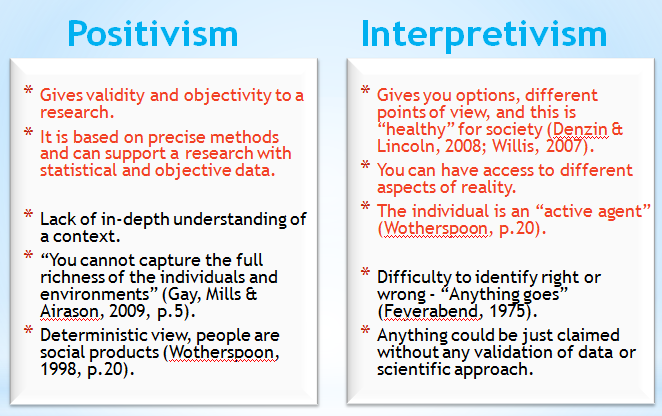Having invested some more energy concentrate the zones of Positivism and Interpretivist in the territory of instructive research I have dissected the fundamental contrasts between the two methodologies with the goal that I can figure out where my position may lie.
Post Positivism
This is generally regarded as a “scientific” approach with methods used that are highly organised, measurable and based on approaches taken by the scientific community involved in researching behaviours in the natural world. The researcher will not be involved with those involved in the research topic and will often use observations as a method of obtaining information.
Martyn Denscombe (1998) describes how for positivists, the aim of social research is to discover the patterns and regularities of the social world by using the kind of scientific methods used to such good effect in the natural sciences.
Key features:
- Scientific
- Objective
- Robust
- Involves identifying causes
- Tests hypotheses
- Uses the methods of the natural sciences
- External reality
- need to collect ‘facts’
- Use of statistics (quantitative)
- Experiments
- surveys
Interpretivist approach.
Interpretivist methodology leans towards the collection of qualitative data and uses methods such as unstructured interviews and participant observation that provides this type of data.
Interpretive researchers realise that they will both influence and be influenced by the research activity they are involved with and that a relationship between the two will develop naturally.
Interpretivists believe that it is important for good research that they analyse how humans interpret activities and that this can be achieved through methods other than those employed by the positivist approach.
Weber (2004) Excellent researchers simply choose a research method that fits their purposes and get on with the business of doing their research. They understand both explicitly and implicitly the criteria that their colleagues will use to evaluate their research.
Although there are clear distinctions between the two methods some writers contend that analysis of the two approaches is irrelevant as good researchers should adopt an approach that best suits the subject or topic.
I would tend favour the Interpretivist approach. Research activity that interests me is likely to be linked to areas that I am familiar with and therefore it is probable that I would be an influence in the research process.
Key features
- Subjective
- constructed reality
- Relativetruths
- Need to explore,explain and underst and reality
- Qualitative
